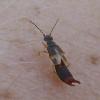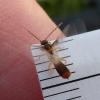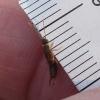Labia minor (Linnaeus, 1758)
Lesser Earwig
Taxonomy:
- Dermaptera›Labiidae›Labia minor
Status:
Distribution
Recordings
Colours show the year of the last record -
| up to 1987 | 1988-97 | 1998 up to present |
Only Recording Scheme datasets are included. Other datasets on the Gateway may hold additional information.
Description:
Likened superficially to a rove (staphylinid) beetle although presence of forceps easily identify it as an earwig. Dull, yellowish brown with a pubescent body and dark head. Similar to the Common Earwig but smaller and less shiny. Smallest earwig in Europe.
Size:
Wings:
Fully developed wings, which are folded away when not in use. This earwig is much more likely to take flight than the Common Earwig and regularly visits outside lights at night.
Food:
Detritus feeder - decaying plant material in warm places.
Habitat:
Native to Southern Europe and native or long established in the UK. Closely associated with dung, compost and rubbish heaps in urban and rural areas (anywhere where there is moist, consistent, natural heating from decaying organic matter).
Phenology:
Life cycle of about three months. Breeding and development occur all year and all stages can be found together where there is moist, consistent, natural heating. Like Common Earwigs, they show considerable maternal care of their eggs and young and even feed them for the first week or two after they have hatched.



